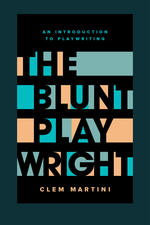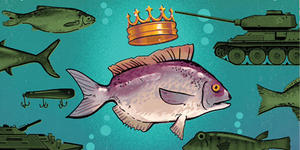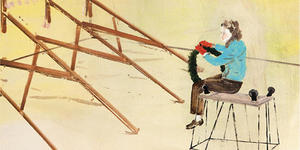
5 essential lessons from The Blunt Playwright
The Blunt Playwright won’t tell you everything there is to know about playwriting. It won’t even try. But it is an essential guide for the craft. Besides providing classic and contemporary scenes to study as well as clever exercises to strengthen writing skills, The Blunt Playwright includes advice on all stages of being a playwright in this updated edition from Clem Martini, an award-winning playwright, novelist, screenwriter, and educator with over thirty plays to his name.
The Blunt Playwright has been a staple in theatre education and creation since it was first published in 2006. In this new edition, Clem has updated references (a lot has changed since then) and lessons, making the book even more helpful. But don’t come to the book expecting a ‘how to’—expect a ‘how about.’ Now how about you take a look at these five essential lessons?
If you wish to improve as a writer—write
“This is so obvious one is almost tempted not to mention it,” writes Clem early on in the book. “Before there were writing teachers, writing manuals, expensive writing retreat coaches, clinics, dramaturgy, writing theory, or writing workshops—there was writing. If you are serious about becoming a writer, then write. It’s that simple. Sit down. Start now. Maintain a daily routine and don’t stop. The writing itself will teach you things if you let it. Writing is simultaneously very complex and very simple . . . The bitter medicine every writer must swallow is that the cure for most writing ailments is continued practice. If you wish to improve as a writer—write. If you wish to better understand the writing process—write. If you wish to get beyond fear and writer’s block—write. It’s tough, astringent medicine, but, sadly, it is the only cure.”
There is no special place for ideas
Clem writes that more than any other question besides “Can you really make a living as a playwright?” playwrights are often asked “So, where do ideas come from?”
“It’s as though it was imagined that playwrights travelled to a special place—a place where other less-talented playwrights or people who can’t write plays at all are forbidden to visit—to get their good ideas. Let’s be clear. There is no special place.”
Clem suggests using a journal to record daily observations, recollections, and overheard snippets of dialogue; maintaining meticulous files of events and interests; or developing an idea through writing a character. There are even some exercises in the book that suggest other strategies, “but the general rule is if you truly and fully engage in your own life, ideas generally appear.”
Don’t chase originality
Clem gives a list of thirteen commonly made writing mistakes in the book, but we’ll tell you one here: don’t frantically chase originality.
“The writer, afraid they will be discovered to be untalented, unintelligent, unfunny, perverse—whatever—moves to other more original sources. Frequently someone else’s. Almost invariably when someone strives for ‘originality’ they end up sounding remarkably like something being done somewhere by someone else.”
It’s in rewriting that much of the creative work really happens
“Many people believe that the initial burst of energy that goes into creating the first draft is the creative exercise and everything after that is a more mechanical function,” writes Clem. “Not so. It’s often in rewriting that much, maybe even most, of the creative work really happens. Rewriting is the stage at which one can investigate character and story much more thoroughly, because at this point you know so much more than you did when you first began.”
Acknowledging that rewriting can be a soul-consuming exercise, Clem explains breaking the activity into six stages: inhale and exhale, read again, assess, plan, execute, and explore.
Know how to give and get criticism
Once you have a script ready to be shared with others, you present it in a class, group, or even just to your closest confidants. Letting go of something that only you have had access to until now, and hearing what other people think, is hard. Knowing how to give and get criticism is helpful not only for etiquette and education, but it can be essential to making your work even better.
Clem notes that giving criticism means presenting an objective opinion that paints a complete picture. Be precise, ask questions, and don’t argue a point. In terms of surviving critique, Clem gives some helpful tips: don’t fuss, write it down, and don’t feel like you have to explain. He also notes that “you can lecture your group for not getting this or that point of your play, you can point out the clever cultural references, but you cannot make them like it if they do not already. So don’t try.”
Feeling inspired to get back to writing? There are more lessons, exercises, and examples in the updated The Blunt Playwright! Get your copy to keep on your desk for when you need a note of encouragement or support.



Comments